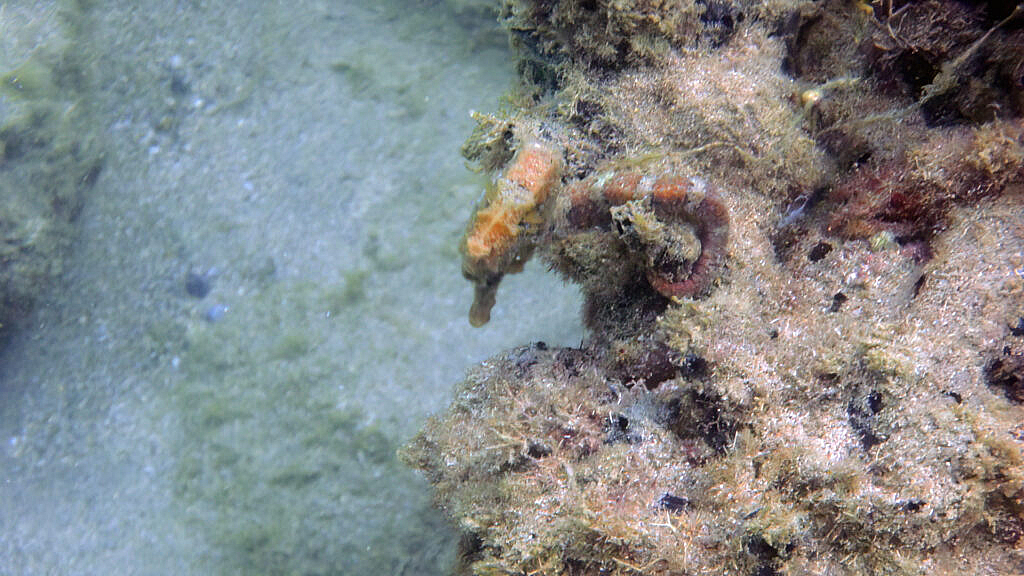I was listening to BBC Radio 4 last week. It was reporting on the Poole Harbour oil spill. It seems that the mixture of oil and water from that spill now risks running into Studland Bay, the most globally-important breeding area for spiny seahorses.
The what?
I know. It surprised me, too. I’m a naturalist and I take an active interest in all British wildlife, and even so I was only vaguely aware that seahorses live in Britain. I’ve watched seahorses, while snorkelling in the Caribbean. I found them so fascinating that when I finally emerged from the sea after several hours, my back was badly sunburnt. But I suppose I had always considered seahorses as too exotic for dreary old Britain. And that’s part of the problem here.

During the interview, Neil Garrick-Maidment, Executive Director of the Seahorse Trust, was outlining the severe threat that the oil spill poses to Studland Bay’s seahorses, when he was asked that question.
That question. You know the one. It’s the same question that always gets asked whenever human priorities clash with those of the natural world, and it sickens me every time I hear it. It is asked in different ways, but the basic question is always the same:
Why should we care?
So seahorses may die because of the oil spill, the question implies, how does that impact humans? The implication is always that unless there is harm to people, it doesn’t matter.
You can see that question hard at work in Poole. If the oil spill had been contaminating drinking water, you can bet that the response would be more than a single oil skimmer and some booms that have not been particularly effective at limiting the spread of the oil. People aren’t being directly and obviously hurt, so our response shifts down a gear. We care about the natural world only when it fits in with our needs. But the fallacy, the outright stupidity of this argument, and that question, is that we don’t have a clue how things hurt us. There is a rich history of humans seeing the animals and plants around them as worthless until they realise, too late, that they are vital. And that’s the other part of the problem here.
Recently I’ve been reading the excellent Ten birds that changed the world, by the nature writer Stephen Moss. (And no, I didn’t get a free copy, and I’m not paid for plugging it: I don’t monetise my blog). One of the stories in that book is that of Chairman Mao Zedong. In 1958, the Chinese premier felt that sparrows ate too much grain. He declared them a public enemy, and encouraged China’s population to eradicate them, which they duly tried to do. And sparrows did indeed eat grain. But what the Chinese premier didn’t know was they ate far more insects, and their sudden decimation meant that insect pests, especially locusts, flourished. Crops were ravaged, and famine resulted. Millions of Chinese died through little more than their ignorance of how the natural world worked. China eventually had to import a quarter of a million replacement sparrows from the Soviet Union to restore balance.
Here’s another true story. The reason why Australian bushmen traditionallywear cork-rimmed hats is because Australia had a plague of flies. It had a plague of flies because it had the wrong kind of dung beetles. With a healthy dung beetle collective, dung pats are taken down into the soil, where they act as a fertiliser, and the burrows which the dung beetles make aerate the soil and improve its structure, creating rich and healthy pasture. Without dung beetles, dung pats can hang around for weeks or even months, and become a toxic pollutant, destroying pastureland. When Australians imported cattle by the thousand to their new country, their dung beetles, which had all evolved to cope with marsupial dung, could not cope with cow pats. They were left on the surface, and acted as breeding grounds for untold billions of flies – and hence the cork-rimmed hats. It took 23 years of importing western dung beetles for Australia to rid itself of the imbalance.
And that is the both the link between seahorses and Chairman Mao, and the answer – or at least, one answer – to the question. Why should we care if oil harms seahorses? Because we don’t know what else that means. With every passing year we learn things about the complexity of the natural world that astonish us. Fish that design tools. Mind-control fungi. We tamper with it at our peril. Allowing oil to escape into Studland is like closing your eyes and throwing yet another spanner into the clockwork of the natural world, while hoping that whatever it breaks won’t come back to bite us. But all too often it does, and usually when it is too late for us to do anything about it.
But there is, of course, another answer to the question ‘Why should we care?’. And that answer is because it’s not our planet. Not only does it belong to every other species out there, it belongs to our grandchildren and their grandchildren, too. And just as we may roll our eyes at the stupidity of the sailors who wiped out the dodo in a little over 180 years, maybe one of your distant descendant will roll their eyes at the stupidity of our generation, who for the want of some effort contributed to the demise of one of the world’s most interesting, gender-reversing fish.
If you want to know more about the Studland seahorses (or seahorses in general), contact the Seahorse Trust here: https://www.theseahorsetrust.org/


Social Profiles